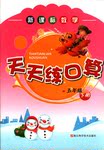题目内容
Scientists have made the world’s first human-sheep----with the body of a sheep and half-human organs(器官). Amazing, but true. The sheep is15percent human and 85 percent sheep. The breakthrough(突破)makes it possible to use animal organs in human bodies in the future. Professor Esmail Zanjani of University of Nevada, US, has spent seven years And over $9 million on the work. Zanjani took stem cells(干细跑) from the human body and put them into the sheep while it was still in its mother’s body. The stem cells made other cells that grew into organs. Zanjani believe that in the future such sheep might be used to help humans. Two months later a human-sheep is born, it has a liver(肝脏), heart, ling(肺) and brain that are part-human. These organs could be used to help people in need of them. There are different opinions about his work, however. Some say that scientists don’t have the right to create new creature(生物). Using animal organ might bring animal viruses(病毒) into human bodies. Others are afraid that the work might change sheep. But Professor Anjani has said that this is impossible.
小题1: According to the passage, we know that the first human-sheep looks like________.
小题2: The appearance(出现) of the first human-sheep means_________.
小题3:Some people think it’s not good to use animal organs because they’re afraid that _____
小题4:. Zanjani put some stem cell from the human body and put them into the sheep while it was still in its mother’s body. He “____________” .
小题5: According to the passage, “__________” is not true.
小题1: According to the passage, we know that the first human-sheep looks like________.
| A.a sheep | B.a goat |
| C.a cat | D.an elephant |
| A.sheep will be cleverer and stronger in the future |
| B.sheep are as important as human in the future |
| C.sheep will take the place of humans in the future |
| D.animal organs may be used in human bodies |
| A.humans will change into animals |
| B.There will be fewer and fewer animals in the future |
| C.the organs may bring animal viruses into human bodies |
| D.many animals will be dead after they give their organs to humans |
| A.created a new stem cell | B.created a new creature |
| C.created a new organ | D.created a new food |
| A.The world’s first human-sheep is 15% percent human and 85% sheep |
| B.The world’s first human-sheep has many organs that are part-human |
| C.Zanjani created the world’s first human-sheep to make the sheep grows faster |
| D.The world’s first human-sheep is a sheep with the body of a sheep and half-human organs. |
小题1:A
小题2:D
小题3:C
小题4:B
小题5:C
试题分析:这篇短文主要介绍了科学家们已经发明了世界上第一个人造羊,美国教授相信在未来这些羊可以用来帮助人类。然而,关于他的工作有不同的看法。有人说,科学家们没有正确的创建新生物。使用动物器官可能使动物病毒进入人体。其他人则担心这项研究可能会改变羊。但是Anjani教授说那是不可能的。
小题1:细节理解题。根据短文 Scientists have made the world’s first human-sheep----with the body of a sheep and half-human organs(器官),可知是羊的身体,所以看起来像羊,故选A。
小题2:细节理解题。根据短文The breakthrough(突破)makes it possible to use animal organs in human bodies in the future可知这个突破在未来人类的身体使用动物器官成为可能。故选D
小题3:细节理解题。根据短文Using animal organ might bring animal viruses(病毒) into human bodies.故选C
小题4:推理判断题。根据Two months later a human-sheep is born, it has a liver(肝脏), heart, ling(肺) and brain that are part-human.可知新的生物出生了,故选B
小题5:是非判断题。根据短文These organs could be used to help people in need of them.可知这些器官使用来帮助需要的器官的人的,故C错误,故选C。

练习册系列答案
 天天练口算系列答案
天天练口算系列答案
相关题目